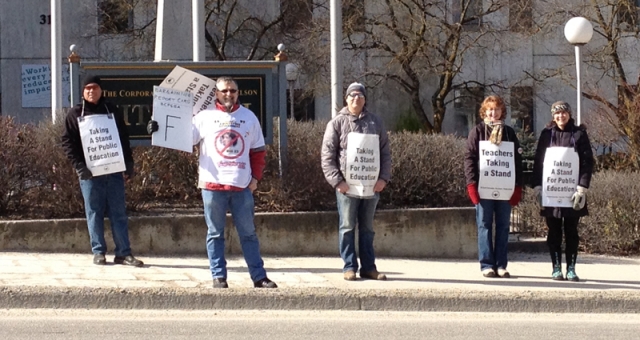B.C. teachers ratify agreement, return to work in September
Teachers made it official Friday, although the results of the final vote were less than overwhelming.
The province’s 40,000-plus members voted to ratify the agreement-in-committee reached on Tuesday, June 26 with the government’s bargaining agent, the BC Public School Employers’ Association.
In a province-wide vote conducted Wednesday to Friday (June 27–29), a total of 21,044 teachers that cast ballots voted 75 percent in favour of the deal.
However, the turnout rate was only 52 percent, which is a stark contrast from the 90 percent of teachers who voted at the beginning of the recent school year in favour of the “teach only” job action by the B.C. Teachers Federation.
“I doubt you could find a single teacher in BC who is happy with this agreement because it does absolutely nothing to improve the situation in classrooms for students or teachers,” said Susan Lambert, president of the BC Teachers’ Federation said on the BCTF website.
“It doesn’t address class size and composition nor does it provide a fair and reasonable salary increase for our members, who have fallen far behind teachers in other parts of Canada.”
Lambert noted that the BCTF was able to get modest improvements in terms of most teachers’ benefits, which were extremely outdated, and in some leave provisions.
“However, the most significant achievement is that that we succeeded in getting government take its concession demands off the table,” she said.
“Throughout 80 bargaining sessions, government refused to budge from net zero and persisted in demanding the elimination of hard-won labour rights and fair process provisions around post and fill, and transfer and recall,” Lambert added.
“With this settlement we have forced government off its punitive agenda.”
The contract includes improved benefits and seniority provisions but no wage increases.
The employers’ association bargained under a provincial government “net zero” mandate that said any wage increases must be offset by claw-backs elsewhere in the contract.
In the end the BCTF recommended teachers vote in favour of the contract, but the union complained it only agreed to the deal because the province would have otherwise brought back the MLA in July to legislate a new contract.
The dispute hung a cloud of bitter feelings between the two parties throughout the entire school year, with teachers refusing to perform certain administrative tasks such as filling out report cards.
In March teachers staged a three-day walkout prior to the spring break holiday. The BCTF also choose to withdraw from extracurricular activities as a way to put pressure on BC Public School Employers’ Association.
The vote in favour of the two-year deal means those disruptions won’t affect students when classes resume from summer break in the fall.
However, the BCTF said that stability might be short lived.
The new contract ends in June 2013, just a month after a provincial election, promising to once again draw battle lines between the two sides.
In the mean time the BCTF promises to hold the government’s feet to the fire with continued pressure.
The BCTF will seek redress in the courts for past constitutional violations and to challenge Bill 22, which ordered an end to the teachers’ job action and compelled a mediation process under threat of harsh fines.


























Comments